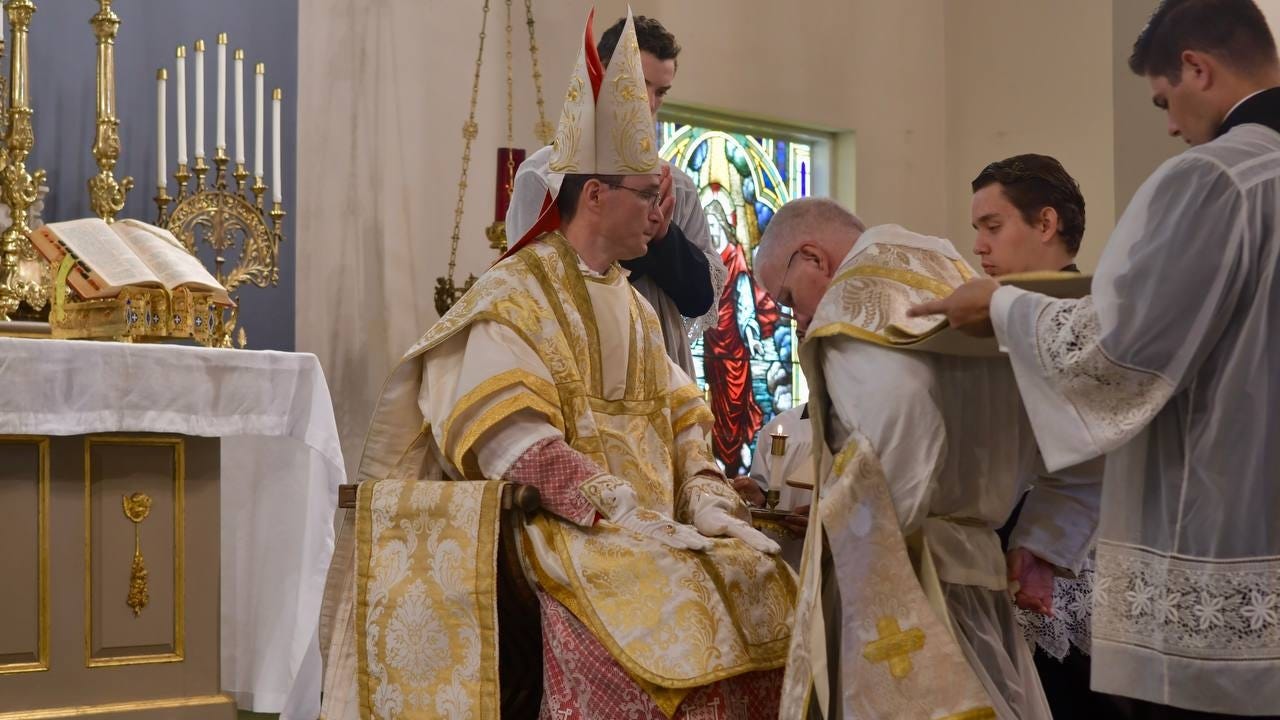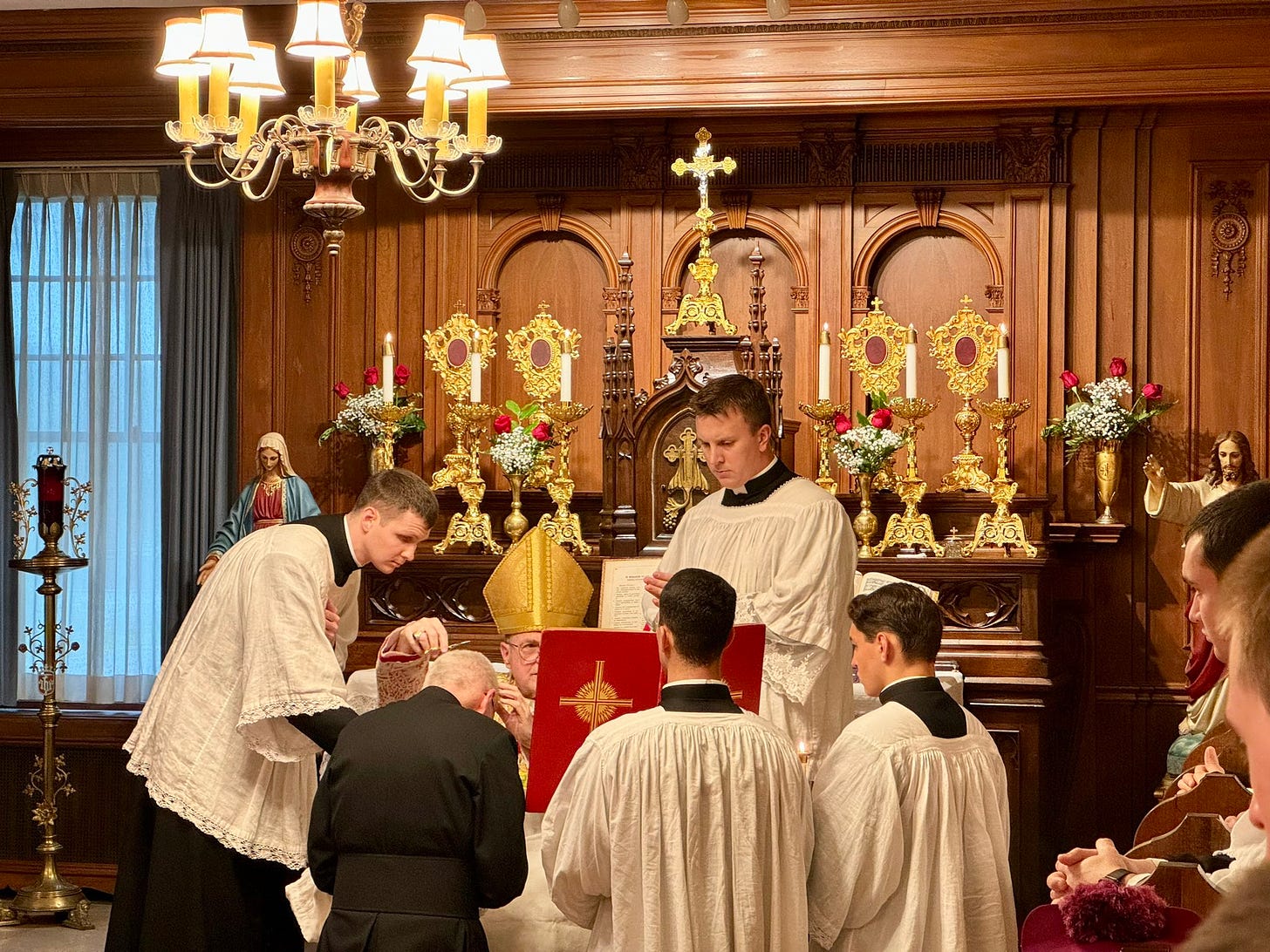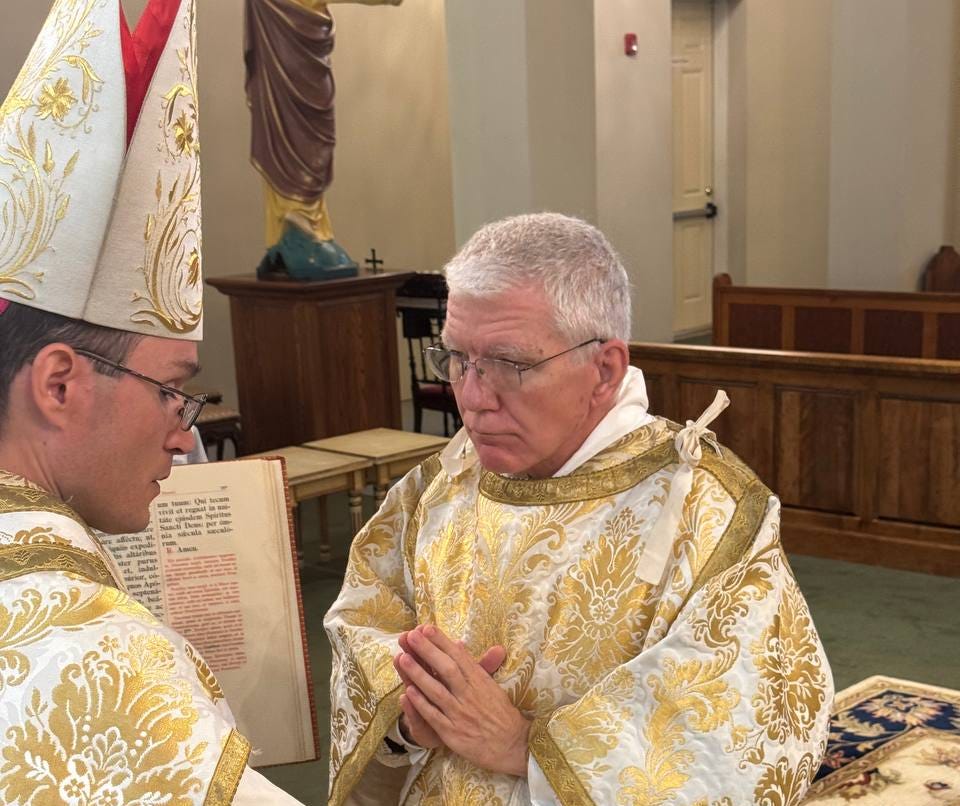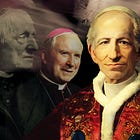Former Jesuit and pro-life stalwart conditionally ordained to the priesthood
Fr James Marshall, pro-lifer and former member of the Society of Jesus, has been conditionally ordained by Bishop Germán Fliess of Bishop Donald Sanborn's Roman Catholic Institute.

On Saturday, 14 December 2024, James Marshall was conditionally ordained to the Catholic priesthood (ad missam) by Bishop Germán Fliess of the Roman Catholic Institute.1
The Roman Catholic Institute is a traditionalist organisation founded and led by Bishop Donald Sanborn. It holds to what its members call “The Thesis”—namely that:
“The Vatican II ‘popes’ are not true popes since they posit an obstacle to the reception the authority of Christ. […]
“The thesis also holds that the Vatican II ‘popes’ succeed as legal designees to the papacy, and therefore continue the line of St. Peter materially. This means that the Vatican II ‘popes’ are legitimate designees to be true popes, but lack jurisdiction, because of the obstacle that they posit to the reception of the authority.”2
Marshall himself entered the Society of Jesus in 1991, and believed himself to have been ordained to the priesthood in 2003.
Why would Marshall submit to a “second” ordination? Is not such repetition of a sacrament a sacrilege? Does such a step involve a denial of grace previously given?
Marshall’s ordaining bishop used the new sacramental rites which had been reformed following Vatican II. There are several reasons and arguments why it is not possible to be morally certain that these rites validly confer the priesthood or the episcopate, and this problem is compounded when the ordaining/consecrating bishop was himself ordained/consecrated in the new rites.
The arguments are discussed in detail here.
Although Fr Marshall has been ordained by an organization which holds that we are currently in a period without a reigning Roman Pontiff, concerns about the validity of these rites are by no means limited to hold this conclusion, nor do they depend on such a conclusion. Such concerns have been expressed by men such as Archbishop Marcel Lefebvre and many others (as can be seen by following the link above).
As it is morally impossible for Catholics to receive sacraments when there is a prudent doubt of their validity, the only possible way to preserve sacramental integrity, safeguard the common good, and secure peace of conscience, is a systematic programme of (at least) conditional ordination/consecration of clerics whose orders depend on the validity of the Novus Ordo rites.
The legitimacy (and indeed necessity) of conditional ordination in such circumstances is very well established, as has been discussed elsewhere. If the situation is one of doubt rather than positive certainty of invalidity, then the proper course is conditional repetition, which ensures validity whilst taking precautions against repeating an unrepeatable sacrament.
At this certainly valid ordination at the hands of Bishop Fliess, Fr Marshall was assisted by Fr Michael DeSaye—another former “Novus Ordo priest,” who was ordained in the traditional rite by Bishop Donald Sanborn in 2022.
About Fr James Marshall
Taking a step like being ordained a second time sub conditione (under condition) is no doubt dramatic, and requires a lot of humility—especially if one had been functioning as a priest for around 20 years.
Before his ordination, Marshall attained a BBA in Business Computer Systems from New Mexico State University.3 He proceeded to a graduate programme at Texas A&M University, and then pursued a vocation to the priesthood. During the scholasticate, he attained degrees in Philosophy and an M.Div from the Jesuit School of Theology at Berkeley. He also taught theology at the Jesuit Collee Preparatory School at Dallas, Texas.
As a Novus Ordo priest, Fr Marshall worked in a number of parishes in Texas and New Mexico. He was associated with the organization Priests for Life, who said of him in 2006:
“Fr. Marshall became interested in pro-life work during his years of theology studies in California. The shocking realities that nearly half of all Bay Area pregnancies ended in abortion and that the casualties of the one-day tragedy of 9/11 were but a fraction of abortion's every day casualties (multiplied by 365 days a year over many years) stirred in him an urgency to work in this area.
“In his short time as a priest, Fr. Marshall has spent many hours on the sidewalks by abortion facilities in the cities he has worked, counseling women and men and praying. He was a weekly guest on a Spanish-speaking radio talk show whose focus was abortion and has helped organize Rachel's Vineyard and other post-abortion retreats, as well as retreats for Project Gabriel and other pro-life volunteers. Fr. Marshall has served on the board of Fertility Care Services of El Paso, an organization that promotes the Creighton Model of natural family planning; he believes that the spiritual principles of St. Ignatius' Spiritual Exercises are a potentially indispensable tool for fighting the battle against the culture-of-death.
“In a profound way, Fr. Marshall has experienced his work with the poor, the handicapped, the imprisoned, and youth as Christ's invitation to enter into His wounds. These deeply loved children of God are some of His most neglected and so reflect the image of the crucified Christ Himself. Fr. Marshall yearns for the day when God's most abandoned and despised children, the countless holy innocents aborted in the womb, will be reunited with their mothers and fathers at the Lamb's Wedding Feast.”4
There is an amusing video online of Marshall playing a hymn to Our Lady on the trumpet at such a sidewalk vigil.
2023 interview—growing realisation of the problems
Over the years, Marshall came to a growing awareness of the crisis in the Church.
For example, despite being in a position of teaching theology, it was not until many years later—once he had started using the pre-conciliar liturgy (there are videos on YouTube of him using this rite from 2019)—that he came to understand that the Mass is a propitiatory sacrifice. In an interview in 2023, he said:
“I’ve been doing a lot of reflecting on that. And I knew the word “sacrifice” is used in the Novus Ordo Mass: “Pray, brethren, that my sacrifice and yours may be acceptable to God, the almighty Father.” So, I knew sacrifice played into it, but my understanding was really one much more of emphasis on the meal part of the Mass. And I never really thought too much about the sacrifice part. I didn’t know what the sacrifice meant.
“I didn’t—I just frankly didn’t understand it. […]
“But it wasn’t until I started celebrating the traditional Latin Mass on a regular basis—on a daily basis—that I began to see something wasn’t coherent.”5
Over time, this lack of coherence seems to have been what led to Marshall leaving the Jesuits, with the official departure taking place in 2022.
While the use of the traditional rite certainly does not always have this effect, it is a clear demonstration of why the Conciliar/Synodal Church cannot tolerate its spread, and has sought to suppress it with Traditionis Custodes.
Seminary experience
Marshall entered Bishop Sanborn’s Most Holy Trinity Seminary. Speaking of the emphasis on the sacrificial nature of the Mass there, he said:
“It’s words I need to keep hearing because they—they are the whole meaning of what I want to be and what I want to do. It’s everything.
“And it involves salvation—of myself and other people. It’s not just an activity we’re doing. It’s so important. It’s the very foundation of our faith.”
When discussing his experience of returning to seminary as a man in his 60s, Marshall said:
“[The] Modern Errors class—that’s with Bishop Sanborn and with Fr. Desposito—that’s been very eye-opening.
“I’ve heard these things before in my classes that I took previously. However, I didn’t know any of these things were bad. I didn’t know any of these things were poisonous. I didn’t know […] the darkness behind them.
“And I never really did understand them. I felt I was a very confused theology and philosophy student back then. But now, it’s a whole different thing to hear the reason why Kant, or Descartes, or, any of those, are bad. They’re unhealthy. They’re poisonous.
“It’s very interesting. And it’s almost on a daily basis when I’m coming into one of my classes.
Speaking of such modern errors, Marshall said:
I have the hands-on experience with it. And I have the experience of imbibing it all and making it be a part of my way of who I am as a Catholic.
That’s the hard part to untie because it involves a lot of detachment. And ultimately, I think what the difference is—I think there are so many traps in the modernist theology, in the Novus Ordo Mass. I think there are so many traps to pride and self-centeredness.
That’s been my observation. And so it’s very hard to detach from those things and to see that the main point of all this is the glory of God—not me, myself, and I.
Marshall’s message to others
At the end of this 2023 interview, Marshall also gave the following message to his former parishioners and friends in the Novus Ordo milieu:
I’ve kept in touch with many people, and so, on a pretty regular basis, I’m either defending what I’m doing or explaining what I’m doing. It’s very difficult sometimes.
What I would say to them is: pray for the grace of courage to look at the truth, and to look at the truth with all the boldness that you can.
Because it’s a question of this council called Vatican II, which is to be dumped. And it’s a question of the man sitting in the Chair of St. Peter who should not be sitting there—because he’s not a pope. And those are things that are very hard to come to. […]
So, just pray for the grace of courage. Because I think we can talk about it, and we can have arguments about it, but at some point, we have to do something. We have to take some action. […]
One of my points of reflection has been this: I think it’s really two different religions that we’re dealing with. I think there’s a Novus Ordo religion, and there’s a Catholic religion.
And I have to say, part of the reason I stayed so long—31 years—as a Jesuit novice, seminarian, and priest was because there was a part of me that refused to look at the truth.
The Society of Jesus was very, very good to me. Very good. So, I’m not putting anything on the Society of Jesus.
But there comes a point where we have to make a decision. The Society of Jesus very gracefully allowed me to leave with grace. My provincial was very good to me.
But I guess there was a point where I had to see the writing on the wall. That’s been part of my reflection.
Marshall was tonsured on September 2023:

He was ordained to the diaconate in early November 2024 by Bishop Fliess:

Conclusions and encouragement for individuals
No doubt this topic will seem shocking to those encountering it for the first time.
Clerics in the same position that Fr Marshall was in, before leaving the Jesuits, may be concerned about scandalising those whom they have absolved, communicated, anointed (or confirmed, ordained and consecrated, if they are bishops).
They may be concerned about those who might mistakenly question the validity of their own baptisms and marriages, even though these sacraments do not depend on the validity of the ministers’ orders at all.
No doubt these are serious concerns. I do not hope to answer them here. However, we can note in passing that such possible harm pales into insignificance compared to the actual harm caused by doubtful or invalid sacraments, as well as the false religion and reforms of Vatican II.
The good achieved by professing the faith, rejecting error, and standing up for sacramental validity must vastly outweigh any possible scandal caused by this practical course; further, such possible scandal caused by doing what is right can surely be left in God’s hands.
Others, both laymen and clerics, may also be concerned about having to deny God’s work in themselves and amongst others, apparently through the new rites.
But this practical course does not entail denying the validity of these sacraments, still less of grace. By definition, sacraments which are doubtfully valid are also possibly valid, in the abstract: as such, it appears possible for someone to submit to conditional repetition of these sacraments, in good conscience, despite not being definitively convinced of the arguments. One can recognise the worth of arguments for an objective state of doubt, or for the necessities of the common good, without personally embracing the doubt or conclusion of invalidity oneself.
Finally, no-one is obliged to believe that what may be many graces, apparently attached to these new rites, were mere illusions. On the contrary, “The Church does not tell you to believe anything so absurd.”
This latter quote is taken from the article below, which addresses this very topic.
In the meantime, we wish Fr Marshall all the best for the future, and thank him for taking the difficult decision of submitting to conditional ordination—which is the only possible way securing sacramental integrity, the common good and peace of conscience for all.
See our full index on this subject here:
HELP KEEP THE WM REVIEW ONLINE!
As we expand The WM Review we would like to keep providing free articles for everyone.
Our work takes a lot of time and effort to produce. If you have benefitted from it please do consider supporting us financially.
A subscription from you helps ensure that we can keep writing and sharing free material for all. Plus, you will get access to our exclusive members-only material.
(We make our members-only material freely available to clergy, priests and seminarians upon request. Please subscribe and reply to the email if this applies to you.)
Subscribe now to make sure you always receive our material. Thank you!
Follow on Twitter, YouTube and Telegram:
“Rev. Mr. James Marshall, our seminarian who is a former Novus Ordo Jesuit, will be conditionally ordained to the priesthood by Bp. Fliess this Saturday, December 14.”
Taken from the Weekly Updates of Queen of All Saints Chapel website, Monday 16 December 2024.
Bishop Donald Sanborn, ‘Explanation of the Thesis of Bishop Guérard des Lauriers’, June 29, 2002. p 5. Available at https://mostholytrinityseminary.org/wp-content/uploads/2019/01/Explanation-of-the-Thesis.pdf
These and other details taken from https://www.priestsforlife.org/newsletters/v16n03mayjun06.pdf






Fr Marshall has to be commended for his brave act, putting the glory of God and salvation of souls before his personal comfort. No doubt it was a traumatic decision and no doubt that decision will be rewarded with outpourings of grace both for himself and his flock. The burden of acting under the uncertainty of the validity of one's own priesthood must be debilitating and surely he must be (by the grace of God) be feeling the relief and the joy of being true to ones informed consience. May many more clergy be inspired by Fr Marshall's humility and bravery to take the steps necessary to ensure the validity of their priesthood 🙏